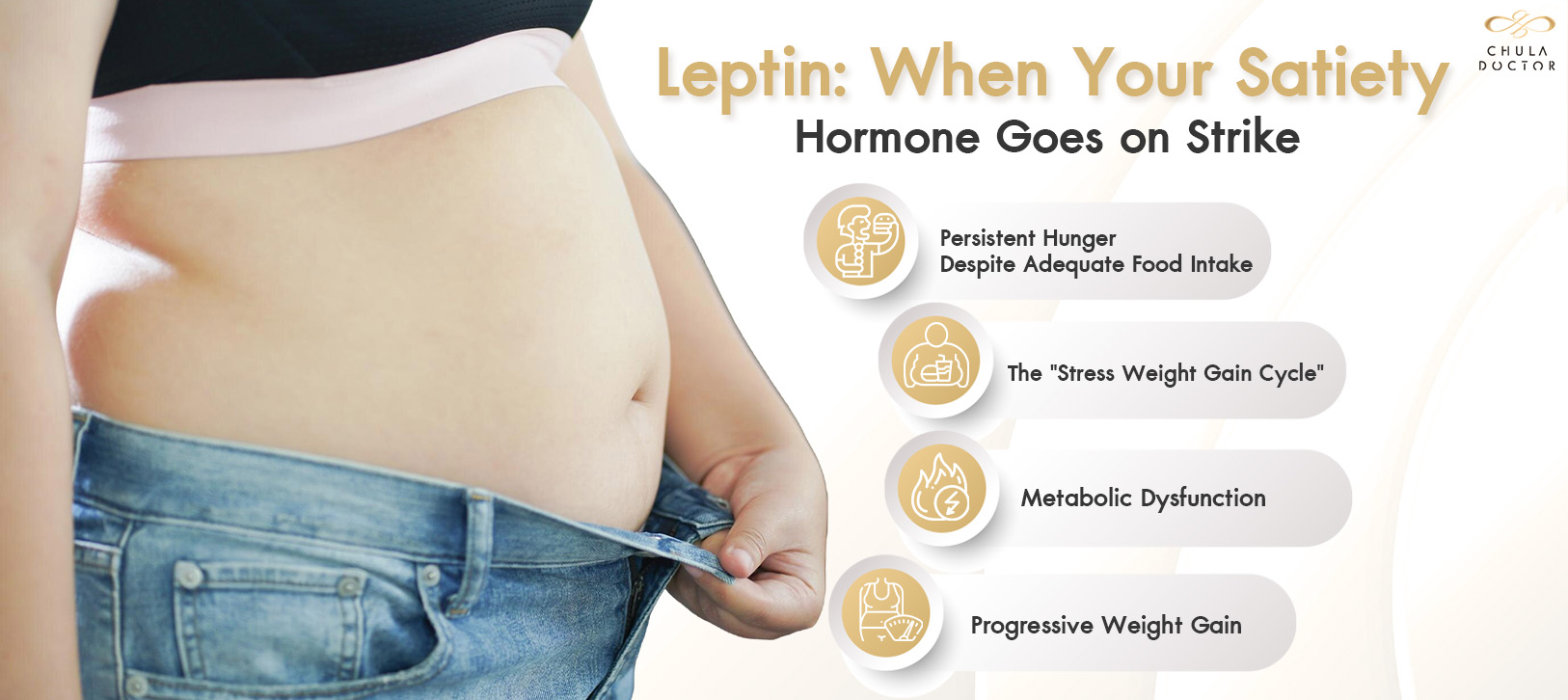“Why do I keep gaining weight when I’m stressed?” It’s a common question that plagues many people, yet few understand that the relationship between stress weight gain and body weight is deeply rooted in our hormonal system. In today’s world of soaring living costs, intense workplace competition, and overwhelming daily pressures, many find themselves trapped in chronic stress that silently impacts their health and waistline. Let’s dive into why stress makes weight loss so challenging and discover effective ways to break this cycle.
Cortisol: The Hidden Culprit Behind Fat Stress

When your body encounters stress, the adrenal glands release cortisol, commonly known as the “stress hormone.” This hormone plays a crucial role in regulating blood sugar, metabolism, and stress response. When cortisol levels rise, several changes occur:
● Blood Sugar Spikes
During periods of stress weight gain cortisol, your body triggers glucose production from proteins and fats, leading to elevated blood sugar levels. This prompts insulin release, ultimately promoting fat storage.
● Increased Abdominal Fat Storage
Cortisol directly influences fat distribution, particularly favoring abdominal fat accumulation. This visceral fat poses greater health risks than fat in other areas, increasing the likelihood of heart disease and diabetes.
● Enhanced Appetite
Stress triggers the release of brain chemicals that drive hunger, especially for high-sugar and high-fat foods. These foods temporarily boost mood-enhancing neurotransmitters, creating a quick but fleeting sense of relief.
● Decreased Metabolic Rate
Elevated cortisol levels can impair muscle function, reducing overall metabolic efficiency. It also disrupts mitochondrial function – your cells’ power plants – further slowing down your metabolism.
Leptin: When Your Satiety Hormone Goes on Strike

Leptin, produced by fat cells, serves as your body’s natural appetite controller by signaling fullness to your brain. However, chronic fat stress can lead to leptin resistance, resulting in:
● Persistent Hunger Despite Adequate Food Intake
When leptin resistance develops, your brain fails to recognize satiety signals, leading to overconsumption even after meeting your body’s energy needs.
● The “Stress Weight Gain Cycle”
This creates a vicious cycle: stress leads to eating, which provides temporary relief but causes weight gain, leading to more stress about body image, prompting further stress eating.
● Metabolic Dysfunction
Leptin resistance hampers fat burning efficiency as your body struggles to utilize fat stores for energy, leading to continuous fat accumulation.
● Progressive Weight Gain
The disrupted leptin signaling causes your body to store more energy as fat, as your brain mistakenly believes you’re in an energy-deficient state.
From Stress to Plate: Why We Can’t Stop Eating When Anxious

stress weight gain affects not only hormones but also eating behaviors. Many turn to food as a coping mechanism, particularly:
● Sweet Treats
High-sugar foods trigger serotonin release in the brain, creating a temporary mood lift. However, the subsequent sugar crash can lead to irritability and cravings, perpetuating the cycle.
● Fatty Foods
Fats stimulate endorphin release – your body’s natural feel-good chemicals – providing momentary pleasure but packing a high caloric punch that contributes to rapid weight gain.
● Sugary Drinks
These beverages deliver concentrated calories without satiety, making it easy to consume excess calories unconsciously.
● Processed Foods
These typically combine salt, sugar, and fat in highly palatable combinations that trigger reward centers in the brain while offering minimal nutritional value.
3 Keys to Breaking the Fat Stress Cycle

When it comes to managing stress weight gain, quick fixes and crash diets aren’t the answer. Research shows that sustainable weight management requires addressing the root cause: your body’s stress response system. These three science-backed strategies work together to break the cycle of fat stress and help you regain control of both your stress levels and your weight.
1. Regular Exercise
- Reduces cortisol: Consistent aerobic exercise (30 minutes, 3-5 times weekly) helps regulate stress weight gain cortisol The key is to maintain a moderate intensity where you can still hold a conversation. High-intensity workouts can actually increase cortisol when you’re stressed, so start gentle with activities like brisk walking, swimming, or cycling. Morning exercise is particularly effective as it aligns with your body’s natural cortisol rhythm.
- Boosts endorphins: Natural mood elevation without food happens within just 20 minutes of starting exercise. These “feel-good” hormones provide the same emotional comfort you might seek from stress eating, but with health benefits instead of weight gain. Regular exercise can increase your baseline endorphin levels, making you more resilient to daily stressors.
- Enhances metabolism: Combined cardio and strength training optimize fat burning for up to 48 hours after your workout. Aim for 2-3 strength training sessions weekly, focusing on compound exercises like squats, deadlifts, and push-ups. This builds lean muscle mass, which increases your resting metabolic rate and helps combat the metabolic slowdown associated with fat stress.
2. Mindfulness and Breathing Practices
- Stress reduction: Deep breathing techniques activate your relaxation response within minutes. Try the 4-7-8 method (inhale for 4 counts, hold for 7, exhale for 8) or box breathing. Even 5-minute sessions throughout the day can significantly lower cortisol levels and reduce stress-related cravings. Practice these techniques before meals to enhance their effectiveness.
- Mindful eating: Better recognition of true hunger versus stress-induced cravings comes with practice. Before eating, rate your hunger on a scale of 1-10. Ask yourself: “Am I eating because I’m hungry, or because I’m stressed?” Take time to notice colors, smells, and textures of your food. This awareness helps break the automatic stress weight gain response pattern.
- Hormonal balance: Regular meditation helps regulate stress and hunger hormones through consistent practice. Start with guided meditations specifically designed for stress eating. Even 10 minutes daily can improve your body’s stress response and reduce emotional eating episodes. Consider using apps or joining meditation groups for accountability.
3. Adequate Sleep
- Hunger hormone control: 7-9 hours of sleep helps balance leptin and ghrelin levels, your primary hunger-regulating hormones. Create a consistent sleep schedule, even on weekends. Research shows that irregular sleep patterns can increase stress weight gain cortisol levels by up to 50%. Consider tracking your sleep cycles with a wearable device or sleep diary.
- Reduced cravings: Proper rest improves decision-making around food choices by strengthening your prefrontal cortex – the brain’s willpower center. Sleep deprivation can increase cravings for high-calorie foods by up to 45%, especially during afternoon energy dips. Create a relaxing bedtime routine that includes limiting screen time and avoiding heavy meals within 3 hours of sleep.
- Recovery: Quality sleep supports cellular repair and stress resilience at a molecular level. Your body performs critical hormone balancing and tissue repair during deep sleep phases.
Conclusion and Professional Support
Addressing stress weight gain requires understanding the intricate connection between mental and physical health. Successful weight management must encompass stress management, behavioral modification, and holistic health approaches. With proper care and attention, you can overcome stress-related weight gain while building both physical and mental resilience.
If you’re struggling with stress-related weight gain, seeking professional help might be the right step. Consider consulting with healthcare providers who understand the complex relationship between stress and weight, and can provide personalized strategies for your situation. Taking action today is your first step toward better health tomorrow.
At Chuladoctor Clinic, our Sliming Lisa program offers innovative weight loss solutions developed by our expert medical team. This program focuses on balancing cellular metabolism for sustainable and effective weight loss. Under close supervision by specialists, you’ll receive personalized treatment plans to achieve your weight loss goals safely with satisfying long-term results.






